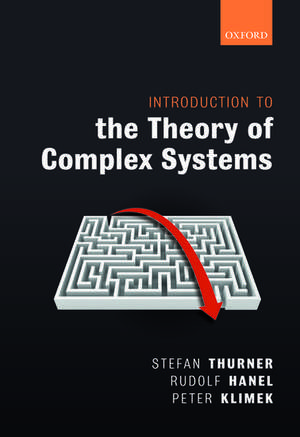Introduction to the Theory of Complex Systems
Autor Stefan Thurner, Rudolf Hanel, Peter Klimeken Limba Engleză Hardback – 4 oct 2018
Preț: 441.48 lei
Preț vechi: 536.27 lei
-18% Nou
Puncte Express: 662
Preț estimativ în valută:
84.49€ • 91.74$ • 70.97£
84.49€ • 91.74$ • 70.97£
Carte tipărită la comandă
Livrare economică 11-17 aprilie
Livrare express 18-22 martie pentru 103.59 lei
Preluare comenzi: 021 569.72.76
Specificații
ISBN-13: 9780198821939
ISBN-10: 019882193X
Pagini: 448
Dimensiuni: 177 x 252 x 27 mm
Greutate: 1.04 kg
Editura: OUP OXFORD
Colecția OUP Oxford
Locul publicării:Oxford, United Kingdom
ISBN-10: 019882193X
Pagini: 448
Dimensiuni: 177 x 252 x 27 mm
Greutate: 1.04 kg
Editura: OUP OXFORD
Colecția OUP Oxford
Locul publicării:Oxford, United Kingdom
Recenzii
Well written and structured
The authors make an excellent job in describing their introduction to Complex Systems theory . . . The book is certainly an excellent start for students (who can find also a series of exercises in every chapter and for practioners). For scientists it is a useful handbook to find whatever needed to start their journey in Complexity Science.
It seems to me that the authors have succeeded admirably in their aims and that, by helping to train and enthuse the next generation of researchers on complex systems, their book will contribute substantially towards overcoming any possible bottleneck that is impeding further progress.
This book is a comprehensive introduction to quantitative approaches to complex adaptive systems, starting from basic principles. It also equips the reader with a basic self-contained toolkit for engaging in complex systems science. It extends earlier classical literature in the field to summarize in a clear, structured, and comprehensive way the methodological progress made in complex systems science over the past 20 years.
This book will surely become a standard text for anyone who wants to seriously understand complexity no matter what their background or stage of career. It is written from a physicists perspective, stressing mechanism, underlying principles and mathematical rigour, yet is eminently readable and pedagogical.
Complexity until now has been lacking a strong theoretical underpinning. Now it has one. This book is a tour de force. Excellent!
The authors make an excellent job in describing their introduction to Complex Systems theory . . . The book is certainly an excellent start for students (who can find also a series of exercises in every chapter and for practioners). For scientists it is a useful handbook to find whatever needed to start their journey in Complexity Science.
It seems to me that the authors have succeeded admirably in their aims and that, by helping to train and enthuse the next generation of researchers on complex systems, their book will contribute substantially towards overcoming any possible bottleneck that is impeding further progress.
This book is a comprehensive introduction to quantitative approaches to complex adaptive systems, starting from basic principles. It also equips the reader with a basic self-contained toolkit for engaging in complex systems science. It extends earlier classical literature in the field to summarize in a clear, structured, and comprehensive way the methodological progress made in complex systems science over the past 20 years.
This book will surely become a standard text for anyone who wants to seriously understand complexity no matter what their background or stage of career. It is written from a physicists perspective, stressing mechanism, underlying principles and mathematical rigour, yet is eminently readable and pedagogical.
Complexity until now has been lacking a strong theoretical underpinning. Now it has one. This book is a tour de force. Excellent!
Notă biografică
Stefan Thurner is full professor for Science of Complex Systems at the Medical University of Vienna, where he chairs the Section for Science of Complex Systems. He is external professor at the Santa Fe Institute, senior researcher at IIASA, and president of the Complexity Science Hub Vienna. He obtained a PhD in theoretical physics from the Technical University of Vienna and a PhD in economics from the University of Vienna. He held postdoctoral positions at Humboldt Universität zu Berlin and Boston University before joining the faculty of the University of Vienna and later Medical University. Stefan started his career with contributions to theoretical particle physics and gradually shifted his research focus to the understanding of complex systems. He is the author of more than 200 scientific articles.Peter Klimek is Associate Professor at the Section for Science of Complex Systems at the Medical University of Vienna and faculty member of the Complexity Science Hub Vienna. His research interests include network medicine, complexity economics, modelling of collective socio-economic phenomena, electoral fraud detection, as well as novel methods to measure systemic risk.Rudolf Hanel is Associate Professor at the Section for Science of Complex Systems at the Medical University of Vienna and faculty member of the Complexity Science Hub Vienna. His research interests range from applications in medical physics to theoretical work on the behaviour of driven regulatory systems with a focus on mathematical issues.
